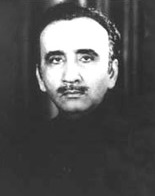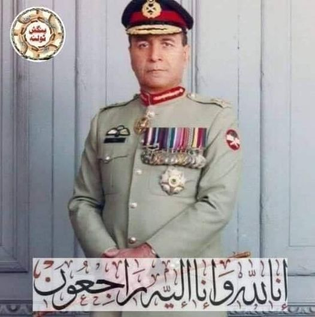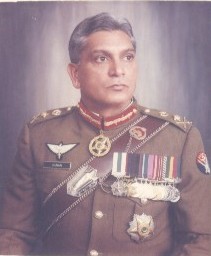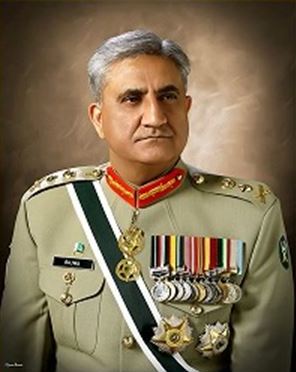
General Asif Nawaz Janjua NI(M),HI(M),SBt,psc,was a senior officer of the Pakistan Army who served as the fourth chief of army staff from 16 August 1991 until his death in 1993.

Mohammad Khan Junejo was a Pakistani politician and statesman who served as the tenth Prime Minister of Pakistan from 1985 to 1988 under president Muhammad Zia-ul-Haq. During his tenure as prime minister he sought to strengthen the power of the office and assert civilian control over state affairs,foreign affairs and military appointments,coming into conflict with Zia-ul-Haq and various senior military officers eventually culminating in his dismissal by Zia. His inquiries into the Ojhri Camp Disaster,appointment of Aslam Beg as VCOAS,various Corps Commanders,growing control over senior military promotions,forays into international politics,rejecting Zia appointments in his cabinet,stance against martial law,austerity policies and purported spying on Zia through the civilianized Intelligence Bureau all contributed to the souring in their relation.
Mahmud AhmedHI(M) is a retired Pakistani three-star rank army general who served as the Director-General of the Inter-Services Intelligence from 1999 to 2001.

The Pakistan Army,commonly known as the Pak Army,is the land service branch and the largest component of the Pakistan Armed Forces. The president of Pakistan is the supreme commander of the army. The Chief of Army Staff (COAS),a four-star general,commands the army. The Army was established in August 1947 after Pakistan gained independence from the United Kingdom. According to statistics provided by the International Institute for Strategic Studies (IISS) in 2024,the Pakistan Army has approximately 560,000 active duty personnel,supported by the Pakistan Army Reserve,the National Guard and the Civil Armed Forces. Pakistan Army is the sixth-largest army in the world and the largest in the Muslim world.
Khalid Maqbool Vohra is a Pakistani military officer who served as Governor of Punjab between October 2001 and May 2008. He is the longest-serving governor of Punjab in Pakistani history.

Mohammed Attiqur Rahman,MC,also known by his nickname as General Turk,was a senior general in the Pakistan Army,a noted military historian,and a senior government official. He was the martial law administrator (MLA) of West Pakistan in General Yahya Khan's military regime. He was educated at St.Paul's school,London and joined IMA in 1939 with a sword of Honour and then joined 4th/12th FFR. He was the last Governor of West Pakistan and implemented the dissolution of the One Unit scheme,after which he became the first Governor of Punjab province.

Muhammad Azam Khan (1908–1994) was a senior general of the Pakistan army who was a minister under Field Marshal Ayub Khan,the first military ruler of Pakistan. Azam was the first commander of the Pakistan Army's I Corps,and was Governor of East Pakistan.

Muhammad Arif BangashHI(M) SBt was a Pakistan Army three-star general who served as governor of the North-West Frontier province of Pakistan.

Ali Muhammad Jan Orakzai,is a retired three-star rank general officer in the Pakistan Army who served as the Corps Commander of XI Corps and the principle commander of the Western Command. As Commander,he commanded all military combat assets and oversaw the peaceful deployment of XI Corps in the Northern Areas and the Federally Administered Tribal Areas (FATA).
General Khawaja Ziauddin Abbasi,also known as Ziauddin Butt,is a retired four-star rank army general in the Pakistan Army,who served as the Chief of Army Staff (COAS),for few hours,until Chairman joint chiefs General Pervez Musharraf reasserted the command and control of the military despite his termination on 12 October 1999.
Moinuddin Haider,HI(M) is a retired three-star rank general of the Pakistan Army,who later served as the Governor and Chief Minister of Sindh,and then as the Federal Interior Minister of Pakistan. He has also served as Chairman Askari Bank,and was the top choice for media representation by the Inter-Services Public Relations (ISPR).

The Armed Forces Institute of Pathology is the main Pakistani institution for defensive research into countermeasures against biological warfare. It is located in the vicinity of CMH Rawalpindi alongside the Armed Forces Institute of Cardiology in Rawalpindi Cantt,Punjab,Pakistan. Established in 1957,the AFIP,supported by civilian and military pathologists,has been engaged in the task of combating virus outbreaks in Pakistan.

Shamim Alam Khan,NI(M) HI(M) SJ SBt LoH,was a four star-rank general in the Pakistan Army who served as the 7th Chairman Joint Chiefs of Staff Committee from 1991 until retiring in 1994.

General Muhammad ShariffNI(M) SPk SI(M) was a Pakistani general who served as the first Chairman Joint Chiefs of Staff Committee from 1976 until tendering his resignation in 1977 over the disagreement with the military takeover of the civilian government by the army.
Muhammad Safdar was the former Governor of Punjab,the largest province of Pakistan,having served from 1999 to 2001. He had previously also served as the Pakistani Ambassador to Morocco and the Vice Chancellor of Punjab University during 1993.

Lieutenant General Jagjit Singh Arora,PVSM,BP was an Indian senior military officer who was the General Officer Commanding-in-Chief (GOC-in-C) Eastern Command during the Bangladesh Liberation War and the Indo-Pakistani War of 1971. He organised and led the ground forces campaign in the Eastern Front of the war,which led to an overwhelming defeat of the combined Pakistan Armed Forces in East-Pakistan that led to the creation of Bangladesh.

Chief of the General Staff is the most coveted position within the Pakistan Army after that of the Chief of the Army Staff (COAS). Although the COAS is the head of the land forces,the CGS is "the organizational lead on both intelligence and operations",hence being in charge of the Military Intelligence (MI) and Military Operations (MO) Directorates. Since 1985,a three-star rank Lt. Gen. is appointed to the post.

The Commander-in-Chief of the Pakistan Army was the professional head of the Pakistan Army from 1947 to 1972. The C-in-C was directly responsible for commanding the army. It was an administrative position and the appointment holder had main operational command authority over the army.

Qamar Javed Bajwa is a retired Pakistani army general who served as the tenth chief of the army staff of Pakistan from 29 November 2016 to 29 November 2022. In 2018 he was ranked 68th in the Forbes list of the World's Most Powerful People.

Farooq Shaukat Lodi,best known as F.S. Lodi,was a Pakistani military officer who served as the Governor of Punjab and Balochistan in 1984,and later serving as the Interior Minister in Zia administration in 1985..















